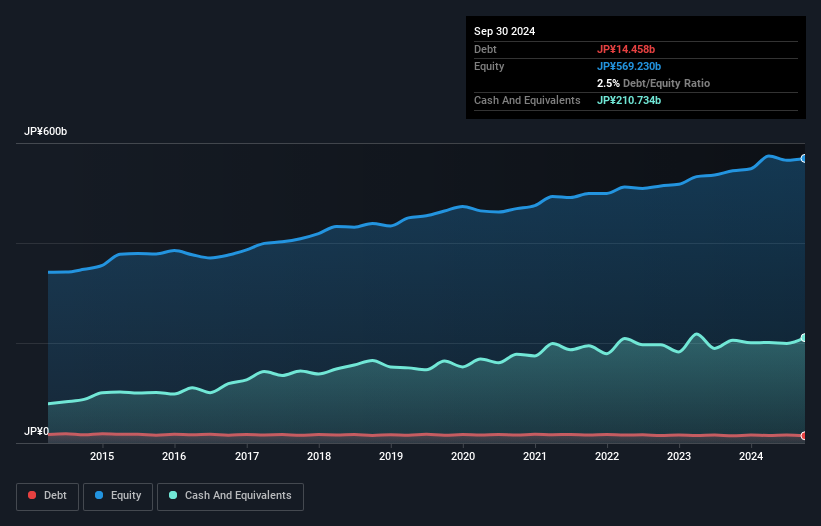David Iben put it well when he said, 'Volatility is not a risk we care about. What we care about is avoiding the permanent loss of capital.' So it seems the smart money knows that debt - which is usually involved in bankruptcies - is a very important factor, when you assess how risky a company is. As with many other companies Kinden Corporation (TSE:1944) makes use of debt. But is this debt a concern to shareholders?
What Risk Does Debt Bring?
Debt assists a business until the business has trouble paying it off, either with new capital or with free cash flow. Ultimately, if the company can't fulfill its legal obligations to repay debt, shareholders could walk away with nothing. However, a more usual (but still expensive) situation is where a company must dilute shareholders at a cheap share price simply to get debt under control. Having said that, the most common situation is where a company manages its debt reasonably well - and to its own advantage. The first thing to do when considering how much debt a business uses is to look at its cash and debt together.
Check out our latest analysis for Kinden
What Is Kinden's Debt?
As you can see below, Kinden had JP¥14.5b of debt, at September 2024, which is about the same as the year before. You can click the chart for greater detail. However, its balance sheet shows it holds JP¥210.7b in cash, so it actually has JP¥196.3b net cash.

How Healthy Is Kinden's Balance Sheet?
We can see from the most recent balance sheet that Kinden had liabilities of JP¥166.5b falling due within a year, and liabilities of JP¥34.2b due beyond that. On the other hand, it had cash of JP¥210.7b and JP¥184.6b worth of receivables due within a year. So it can boast JP¥194.7b more liquid assets than total liabilities.
This surplus liquidity suggests that Kinden's balance sheet could take a hit just as well as Homer Simpson's head can take a punch. With this in mind one could posit that its balance sheet means the company is able to handle some adversity. Simply put, the fact that Kinden has more cash than debt is arguably a good indication that it can manage its debt safely.
And we also note warmly that Kinden grew its EBIT by 16% last year, making its debt load easier to handle. There's no doubt that we learn most about debt from the balance sheet. But it is future earnings, more than anything, that will determine Kinden's ability to maintain a healthy balance sheet going forward. So if you want to see what the professionals think, you might find this free report on analyst profit forecasts to be interesting.
Finally, a business needs free cash flow to pay off debt; accounting profits just don't cut it. While Kinden has net cash on its balance sheet, it's still worth taking a look at its ability to convert earnings before interest and tax (EBIT) to free cash flow, to help us understand how quickly it is building (or eroding) that cash balance. Looking at the most recent three years, Kinden recorded free cash flow of 42% of its EBIT, which is weaker than we'd expect. That's not great, when it comes to paying down debt.
Summing Up
While we empathize with investors who find debt concerning, you should keep in mind that Kinden has net cash of JP¥196.3b, as well as more liquid assets than liabilities. And we liked the look of last year's 16% year-on-year EBIT growth. So we don't think Kinden's use of debt is risky. Over time, share prices tend to follow earnings per share, so if you're interested in Kinden, you may well want to click here to check an interactive graph of its earnings per share history.
If, after all that, you're more interested in a fast growing company with a rock-solid balance sheet, then check out our list of net cash growth stocks without delay.
Valuation is complex, but we're here to simplify it.
Discover if Kinden might be undervalued or overvalued with our detailed analysis, featuring fair value estimates, potential risks, dividends, insider trades, and its financial condition.
Access Free AnalysisHave feedback on this article? Concerned about the content? Get in touch with us directly. Alternatively, email editorial-team (at) simplywallst.com.
This article by Simply Wall St is general in nature. We provide commentary based on historical data and analyst forecasts only using an unbiased methodology and our articles are not intended to be financial advice. It does not constitute a recommendation to buy or sell any stock, and does not take account of your objectives, or your financial situation. We aim to bring you long-term focused analysis driven by fundamental data. Note that our analysis may not factor in the latest price-sensitive company announcements or qualitative material. Simply Wall St has no position in any stocks mentioned.
About TSE:1944
Kinden
Provides integrated electrical and facility engineering services in Japan.
Flawless balance sheet with solid track record and pays a dividend.
Market Insights
Community Narratives




